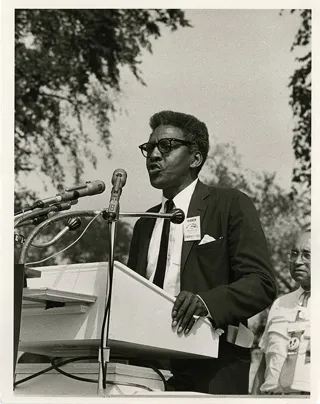As he approached the podium, Bayard Rustin was determined and elated. He expected about 100,000 marchers to converge at the Washington Monument on August 28, 1963. To his delight, approximately 250,000 people cheered as he listed the demands of the march. The March on Washington for Jobs and Freedom began after eight weeks of recruiting marchers, coordinating buses and marshals, scheduling speakers, and managing logistics. Despite Rustin’s critical role as the march’s chief organizer, movement leaders and political leaders alike attempted to remove Rustin from the story because he was gay.
Bayard Rustin was born in West Chester, Pennsylvania, a small town located outside of Philadelphia. As a Quaker, Rustin believed in nonviolence and pacifism from an early age. His work in social justice challenged the status quo and brought him into contact with notable leaders like James Weldon Johnson, W.E.B. DuBois and A. Phillip Randolph. Randolph would later introduce him to Rev. Dr. Martin Luther King, Jr. An effective organizer and strategist, Rustin contributed to the success of several demonstrations; however, he frequently would remain in the background because of his sexuality.

In the mid-twentieth century, homosexuality was illegal and considered by many to be immoral. Rustin was openly gay at a time when people unjustly feared and reviled the LGBTQ+ community. He was arrested several times for his homosexuality. There were concerns among many leaders in the movement that Rustin’s sexuality would discredit and distract from the fight for civil rights.
Rustin remained undeterred by his critics. He would fight for social justice regardless of race, color, ethnicity, religion or sexuality. Every cause he participated in he would bring his brilliant approach to strategy and community engagement. He would become involved in the Gay Rights Movement stating “…it was an absolute necessity for me to declare homosexuality, because if I didn’t, I was part of the prejudice.”
Today, history celebrates Bayard Rustin’s critical role in the Civil Rights Movement as a gay Black man. For more information on Bayard Rustin watch the documentary Brother Outsider.
We would like to thank the anonymous donor of Bob Adelman photographs. If you have an item that you would like to offer the National Civil Rights Museum as we grow our collection, please contact me, Schillica Howard at collections@civilrightsmuseum.org.
Photo Caption: Bayard Rustin, organizer of the March on Washington, addresses the Marchers assembling at the Washington Monument, August 28, 1963. Gift of an anonymous donor.
© 1963 Bob Adelman
Reference: Marcus, Eric. “Bayard Rustin.” Making Gay History. August 06, 2019.